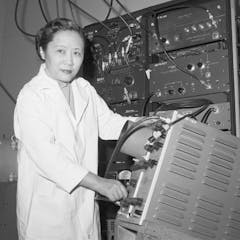
Articles on Radioactivity
Displaying 1 - 20 of 37 articles

Japan has undertaken extensive efforts to decontaminate land in Fukushima – whether they were they right to do so is a complex question.

Some Nobel Prize-winning ideas originate in strange places, but still go on to revolutionize the scientific field. George de Hevesy’s research on radioactive tracers is one such example.

It’s not just the ingredients we should be concerned about. The devices themselves release chemicals that end up in our blood and urine.

To detect dark matter, you need to build an ultra-sensitive detector and put it somewhere ultra-quiet. For one physics collaboration, that place is almost a mile under Lead, S.D.

Should the capsule not be found immediately, we can’t just write it off as lost. A long term system of monitoring is needed to protect humans and the environment.

The lost radioactive source may never be found.

A new particle accelerator has just begun operation. It is the most powerful accelerator of its kind on Earth and will allow physicists to study some of the rarest matter in the universe.

Radiation really is everywhere – and it’s not at all as spooky or dangerous as we often think.

Trouble may arise if the operating reactor is shut down, with risks ranging from a used fuel meltdown to a reactor core explosion.

With Russian troops rolling through the Chernobyl exclusion zone in Ukraine, a biologist who studies wildlife in the area describes the risks of disturbing this radioactive landscape.

Radioactive waste from nuclear medicine facilities will be trucked to and buried near the South Australian town of Kimba. But this decision still faces a range of hurdles.

Chinese American physicist Wu worked on the Manhattan Project and performed groundbreaking experiments throughout her long career.

The element was discovered in the fallout of a thermonuclear blast.

The study of neutrinos produced within the Earth’s interior provides a better understanding of the radioactivity of our planet.

Japan’s plan is a terrible idea, but so is our government’s plan to send nuclear waste to South Australia temporarily.

Documentary or drama? The HBO/Sky series is gripping watching, but sometimes facts make way for artistic licence.

The HBO series ‘Chernobyl’ has reignited interest among tourists to visit Pripyat, but growing up in the disaster’s shadow has made us wary.

With its strange bluish glow and cancer-killing qualities, meet the wundermetal that became one of the great cautionary tales of modern times.

Alongside their famous dangers, radioactive materials have many beneficial uses. With as many more predicted as have already been discovered, nuclear physicists are searching for more isotopes.

Former Russian spies Alexander Litvinenko and Sergei Skripal were both poisoned – one polonium, the other by Novichok. Now that there’s been another nerve agent case, what’s the difference?





